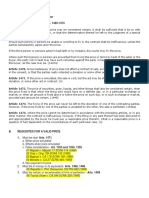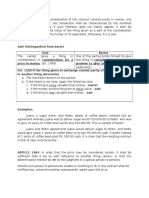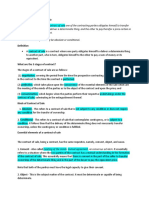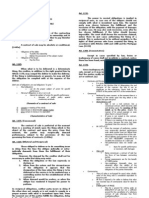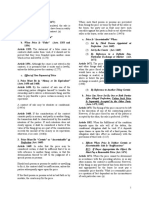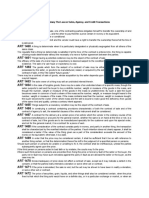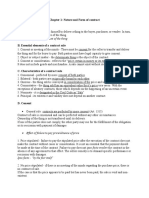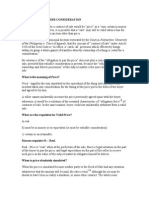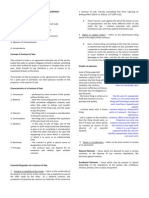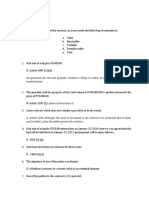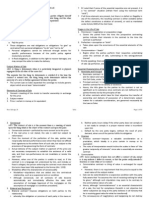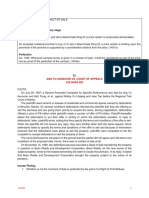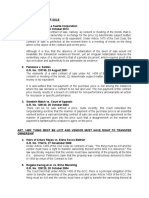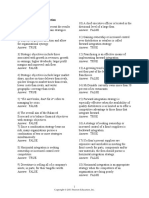Page 2
Page 2
Uploaded by
Radeza Anne PacotCopyright:
Available Formats
Page 2
Page 2
Uploaded by
Radeza Anne PacotCopyright
Available Formats
Share this document
Did you find this document useful?
Is this content inappropriate?
Copyright:
Available Formats
Page 2
Page 2
Uploaded by
Radeza Anne PacotCopyright:
Available Formats
b. If the intent is not clear, then apply the following rules: 1.
If the sold thing is more valuable than money, the contract is barter; 2. If the money and the thing are equal value, the contract is sale; 3. If the thing is less valuable than money, the contract is a contract of sale (Art. 1468, NCC) Note: Meaning of contract of barter or exchange: One of the parties binds himself to give one thing in consideration of the other's promise to give another thing. (Art. 1638) In contrast to the contract of sale, the vendor gives a thing in consideration for a price. Graphic distinction between contract of sale and contract of barter Point of Distinction Contract of Sale Contract of Barter Governing Law Arts. 1458-1637, NCC Arts. 1638-1641, NCC Consideration A price certain in money or its Non-fungible things (Art. 1954) equivalent Rules on Cause and Consideration: Meaning of Cause or consideration the essential reason, which moves the contracting, parties to enter into the contract. The immediate, direct or most proximate reason, which explains and justifies the creation of an obligation through the will of the contracting parties. 2. Difference between cause and motives: The cause is the direct or approximate reason of a contract, whereas the motives are the indirect or remote reasons. The cause is the objective or juridical reason of a contract, whereas the motives are the psychological or personal reasons; The cause for a certain contract is always the same, whereas the motives will differ or vary depending upon who are the parties; The cause can affect the validity of a contract, whereas the motives cannot. 3. Requisites of a valid cause: cause should be in existence cause should be licit or lawful and cause should be true Presumption in cause: Under Article 1354 - the law presumes that a contract has an existing and lawful cause and consideration. Thus, though cause is not stated in the contract, it is presumed to exist and is lawful, unless the debtor proves otherwise. This is only a disputable presumption. 1.
Art. 1469. In order that the price may be considered certain, it shall be sufficient that it be so with reference to another thing certain, or that the determination thereof be left to the judgment of a special person or persons. Should such person or persons be unable or unwilling to fix it, the contract shall be inefficacious, unless the parties subsequently agree upon the price. If the third person or persons acted in bad faith or by mistake, the courts may fix the price. Where such third person or persons are prevented from fixing the price or terms by fault of the seller or the buyer, the party not in fault may have such remedies against the party in fault as are allowed the seller or the buyer, as the case may be. Art. 1473. The fixing of the price can never be left to the discretion of one of the contracting parties. However, if the price fixed by one of the parties is accepted by the other, the sale is perfected. (1449a) Art. 1474. Where the price cannot be determined in accordance with the preceding articles, or in any other manner, the contract is inefficacious. However, if the thing or any part thereof has been delivered to and appropriated by the buyer he must pay a reasonable price therefor. What is a reasonable price is a question of fact dependent on the circumstances of each particular case. Nature/Requisites for Cause Requisites of price in a contract of sale: (a) (b) (c) The price must be in money or its equivalent (Art. 1458) It must be certain or ascertainable (Art. 1469) It must be real, i.e., not simulated, (Art. 1471)
Meaning of a price certain: (a) (b) (c) The parties have fixed or agreed upon a definite amount; or It be certain with reference to another thing certain (See Art. 1472), as where the buyer agrees to pay the price as indicated in the invoices; The determination of the price is left to the judgment of a specified person or persons (Art. 1469) The last two cases are applicable only when no specific amount has been stipulated by the parties.
18. Rules if price is to be determined by a third person:
(a) (b) (c) (d) The price fixed by the third person is binding except when he acts in bad faith or by mistake; In such case, the courts may fix the price; If the third person is unable or unwilling to fix the price, the contract shall be inefficacious (without effect), unless the parties subsequently come to an agreement ; and If the third person is prevented from fixing the price by the fault of the seller or buyer, the party not in fault may choose between rescission and fulfillment with damages in either case. (Art. 1469)
You might also like
- Nature and Form of The Contract of SaleDocument4 pagesNature and Form of The Contract of SaleLaarni Aragon88% (8)
- Boarding PassDocument2 pagesBoarding Passlrc24332725No ratings yet
- Lau Biz202 Macro EnvironmentDocument9 pagesLau Biz202 Macro EnvironmentMai NguyễnNo ratings yet
- Notes 2 Law of SalesDocument3 pagesNotes 2 Law of SalesAnon YmousNo ratings yet
- V PRICE Provisions ReviewerDocument4 pagesV PRICE Provisions ReviewerRegie Rey AgustinNo ratings yet
- Art. 1468-1478Document6 pagesArt. 1468-1478Ge Lato100% (1)
- Consent or Meeting of The Minds Wherein The Contract of SaleDocument4 pagesConsent or Meeting of The Minds Wherein The Contract of SaleTyrelle Dela CruzNo ratings yet
- Under Art 1469, It Clearly States That Price Should Be Certain, and If Not It, The DeterminationDocument4 pagesUnder Art 1469, It Clearly States That Price Should Be Certain, and If Not It, The DeterminationMary Jescho Vidal AmpilNo ratings yet
- Law On Sales Articles 1468-1488Document4 pagesLaw On Sales Articles 1468-1488Wesley Angelo CalayagNo ratings yet
- The Ownership and To Deliver A Determinate Thing, and The Other To Pay Therefor A Price Certain in Money or Its EquivalentDocument12 pagesThe Ownership and To Deliver A Determinate Thing, and The Other To Pay Therefor A Price Certain in Money or Its EquivalentCharl Rey PilonNo ratings yet
- F2Document5 pagesF2Paula Mae DacanayNo ratings yet
- Codal SalesDocument13 pagesCodal SalesFaye AmoradoNo ratings yet
- Minds As To The Price, Despite The: Katrina Veronica Raymundo For The Best Block in Da WorldDocument16 pagesMinds As To The Price, Despite The: Katrina Veronica Raymundo For The Best Block in Da WorldsweetiebongbangNo ratings yet
- Article 1458Document2 pagesArticle 1458Anisah Aquila100% (1)
- Activity Sales 2Document7 pagesActivity Sales 2Chelsea Nicole DantesNo ratings yet
- Title 6 - Law On SalesDocument10 pagesTitle 6 - Law On SalesmrstudymodeNo ratings yet
- Sales Sep 11Document4 pagesSales Sep 11Andrew GallardoNo ratings yet
- Dacion: Contract Where Property Is Alienated To Satisfy/extinguishDocument4 pagesDacion: Contract Where Property Is Alienated To Satisfy/extinguishmaricar_rocaNo ratings yet
- ART 1458 ART 1459 ART 1460: Law - Summary The Law On Sales, Agency, and Credit TransactionsDocument3 pagesART 1458 ART 1459 ART 1460: Law - Summary The Law On Sales, Agency, and Credit TransactionsIsel PauieeNo ratings yet
- Notes 3 Law On SalesDocument2 pagesNotes 3 Law On SalesAnon YmousNo ratings yet
- Price Is The Equivalent Amount of The Thing: Chapter 1: Nature and Form of Contract A. DefinitionDocument4 pagesPrice Is The Equivalent Amount of The Thing: Chapter 1: Nature and Form of Contract A. DefinitionJi YuNo ratings yet
- UP Sales Reviewer 2007Document50 pagesUP Sales Reviewer 2007minNo ratings yet
- Art 1458 - 1506 NCCDocument11 pagesArt 1458 - 1506 NCCFrancis Chu Flores0% (1)
- Sales Notes - Q and A Chapter 4 PriceDocument10 pagesSales Notes - Q and A Chapter 4 PriceAnonymous fnlSh4KHIg0% (1)
- Notes 2 Law of SalesDocument4 pagesNotes 2 Law of SalesKristine Esplana ToraldeNo ratings yet
- Sales Final CodalDocument10 pagesSales Final CodalGen GrajoNo ratings yet
- Sales Chapter 1Document3 pagesSales Chapter 1jonbelzaNo ratings yet
- Cases 1 SALES DoctrinesDocument6 pagesCases 1 SALES DoctrinesDianne ComonNo ratings yet
- Sales Bar ReviewDocument18 pagesSales Bar ReviewLeah Mal DitaNo ratings yet
- Outline/ Lecture On Issues On Delivery in Sales Contracts: By: Atty. Eduardo T. Reyes, IIIDocument53 pagesOutline/ Lecture On Issues On Delivery in Sales Contracts: By: Atty. Eduardo T. Reyes, IIICindy-chan DelfinNo ratings yet
- Nature and Form of ContractDocument6 pagesNature and Form of ContractMerry Lou BaylonNo ratings yet
- Title VI. - SALES CHAPTER 1 NATURE AND FORM OF THE CONTRACTDocument4 pagesTitle VI. - SALES CHAPTER 1 NATURE AND FORM OF THE CONTRACTObe AbsinNo ratings yet
- Law On SalesDocument3 pagesLaw On SalesAnonymous OXOfPRGNo ratings yet
- Sabio vs. International Corporate Bank:: (Removal of Squatters, Las Pinas, Ayala Southvale) (Cement Bags)Document6 pagesSabio vs. International Corporate Bank:: (Removal of Squatters, Las Pinas, Ayala Southvale) (Cement Bags)Sherily CuaNo ratings yet
- Law Summary The Law On Sales Agency and Credit TransactionsDocument8 pagesLaw Summary The Law On Sales Agency and Credit TransactionsJhazz DoNo ratings yet
- SALESDocument64 pagesSALESPLARIDEL PS INTEL100% (1)
- SALES Finals ReviewerDocument90 pagesSALES Finals ReviewerVina VillarroyaNo ratings yet
- Art. 1458Document6 pagesArt. 1458Janet ReyesNo ratings yet
- Pointers in Contract of SalesDocument10 pagesPointers in Contract of SalesGabriel EboraNo ratings yet
- Oblicon Cases 2018 MidtermDocument23 pagesOblicon Cases 2018 MidtermbimbyboNo ratings yet
- Contracts and Special Contracts QuizzesDocument24 pagesContracts and Special Contracts QuizzesGabrielle Ann SeguiranNo ratings yet
- Reviewer Study Guide Final Exam RFLIBDocument53 pagesReviewer Study Guide Final Exam RFLIBendleonesNo ratings yet
- Important Tips On The Law On Sales - Edited 2009Document57 pagesImportant Tips On The Law On Sales - Edited 2009JanetGraceDalisayFabreroNo ratings yet
- Iii. Equitable Mortgage A. DefinitionDocument4 pagesIii. Equitable Mortgage A. DefinitionTrem GallenteNo ratings yet
- Sales ReviewerDocument53 pagesSales ReviewerroansalangaNo ratings yet
- Chapter 1 Nature and Form of The ContractDocument12 pagesChapter 1 Nature and Form of The ContractAndrew Miguel SantosNo ratings yet
- Sales Finals Reviewer - ChanDocument79 pagesSales Finals Reviewer - ChanLenvicElicerLesigues100% (1)
- Sales Discussion - For ClassDocument26 pagesSales Discussion - For ClassMark BajacanNo ratings yet
- Law of SalesDocument54 pagesLaw of SalesEdualina AclanNo ratings yet
- Midterm Coverage CasesDocument56 pagesMidterm Coverage CasesAndrea IvanneNo ratings yet
- By Violet CrystalDocument29 pagesBy Violet CrystalJason Brian E. AvelinoNo ratings yet
- Ascertainment of PriceDocument4 pagesAscertainment of Pricehundaiaccent2002No ratings yet
- Banaticla Trixia Mae A. III A2Document19 pagesBanaticla Trixia Mae A. III A2Vince ManahanNo ratings yet
- F1Document3 pagesF1Paula Mae DacanayNo ratings yet
- Law On Business Transactions: Atty. Karen Rodriguez de LeonDocument61 pagesLaw On Business Transactions: Atty. Karen Rodriguez de LeonRosemarie A. EnorNo ratings yet
- Sales 1466 To 1475Document2 pagesSales 1466 To 1475Teresa Cardinoza88% (8)
- Sales DoctrinesDocument7 pagesSales DoctrinesBenilde DungoNo ratings yet
- Lecture CONTRACT OF SALE Regulatory Framework 1Document19 pagesLecture CONTRACT OF SALE Regulatory Framework 1Pearl Joy O. TaromaNo ratings yet
- Contract of Sale of Personal PropertyDocument13 pagesContract of Sale of Personal PropertyNoel Krish Zacal100% (1)
- Wuolah Free Chapter 9Document23 pagesWuolah Free Chapter 9iñigo molineroNo ratings yet
- Cape Law: Texts and Cases - Contract Law, Tort Law, and Real PropertyFrom EverandCape Law: Texts and Cases - Contract Law, Tort Law, and Real PropertyNo ratings yet
- 2x2 Photo: Operator Data SheetDocument3 pages2x2 Photo: Operator Data SheetNbd Poms100% (1)
- The Impact of Brazil's Coffee Production Fluctuations On The Workforce and On Global ImportsDocument10 pagesThe Impact of Brazil's Coffee Production Fluctuations On The Workforce and On Global ImportsStefania CiorobaNo ratings yet
- Acfrogcpj8f4rb4ruc4ixv3sboxmthrv Scinfrpri Zxkyunmqbvh2ttyciftmytrhiv T7ggynydva5f Ukzezyeph Xobjj2sw4mc0aaya5jkcepw1611chmnkiienbmhk9n 5aghyohatdhdDocument4 pagesAcfrogcpj8f4rb4ruc4ixv3sboxmthrv Scinfrpri Zxkyunmqbvh2ttyciftmytrhiv T7ggynydva5f Ukzezyeph Xobjj2sw4mc0aaya5jkcepw1611chmnkiienbmhk9n 5aghyohatdhddae ChoNo ratings yet
- To Study On Financial Functions of Benco OilDocument15 pagesTo Study On Financial Functions of Benco OilsumiNo ratings yet
- Visvesvaraya Technological University, BelagaumDocument3 pagesVisvesvaraya Technological University, BelagaumSushma SNo ratings yet
- SPAV Law Revisited by CongressDocument11 pagesSPAV Law Revisited by CongressjpNo ratings yet
- Concept of Project Management Program and PortfolioDocument28 pagesConcept of Project Management Program and PortfolioVellinRobisoDatuinNo ratings yet
- Write Off Request FormDocument4 pagesWrite Off Request FormBUDAPESNo ratings yet
- Crossing ChequesDocument17 pagesCrossing ChequesVivek Kumar JainNo ratings yet
- PM1 Project ManagementDocument9 pagesPM1 Project ManagementElaine Governor MarleyNo ratings yet
- Final Deptals COST.1 PDFDocument5 pagesFinal Deptals COST.1 PDFIllion IllionNo ratings yet
- Entrepreneurship Development Notes PDFDocument207 pagesEntrepreneurship Development Notes PDFBlend TrendNo ratings yet
- CH5Document7 pagesCH5Tony SapienNo ratings yet
- Double Sale DigestDocument24 pagesDouble Sale DigestJanelle Dela CruzNo ratings yet
- Statement of Work (SPI X YONDU)Document5 pagesStatement of Work (SPI X YONDU)Luigi Marvic FelicianoNo ratings yet
- Aifta Asean - India Fta: Arguing Against The MotionDocument15 pagesAifta Asean - India Fta: Arguing Against The Motiontyros212No ratings yet
- Aircraft SolutionsDocument21 pagesAircraft SolutionsvakNo ratings yet
- Breakdown Top TipsDocument2 pagesBreakdown Top TipsElchin SattarovNo ratings yet
- Pran FoodDocument7 pagesPran FoodBushra HaqueNo ratings yet
- Special Characteristics PDFDocument11 pagesSpecial Characteristics PDFKristof MCNo ratings yet
- Drum Brake Assy Man Power DetailsDocument9 pagesDrum Brake Assy Man Power DetailsDJ.Tamil selvanNo ratings yet
- Clause - 49Document18 pagesClause - 49Manish AroraNo ratings yet
- LESSON 1 Introduction To Entrepreneurship HumssDocument93 pagesLESSON 1 Introduction To Entrepreneurship HumssSuzane De Los SantosNo ratings yet
- GAAPDocument3 pagesGAAPMarvi SolangiNo ratings yet
- HB 90.6-2000 The Legal Profession - Guide To ISO 9001-2000 The Legal Profession - Guide To ISO 9001-2000Document19 pagesHB 90.6-2000 The Legal Profession - Guide To ISO 9001-2000 The Legal Profession - Guide To ISO 9001-2000SAI Global - APACNo ratings yet
- 13 15Document4 pages13 15Shrey Mangal0% (1)
- Reasons For Failure ND RecommendationsDocument1 pageReasons For Failure ND RecommendationsShrikant PatilNo ratings yet





